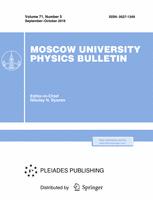Annotation
It is shown that the product of any number N of identical fourth-order matrices $\Lambda$ can always be represented as a linear combination of four independent powers of this matrix: $(\Lambda)^0 = I$ , $\Lambda$, $(\Lambda)^2$, and $(\Lambda)^3$. An analogous feature is established for the N-th degree of a second-rank tensor, i.e., a tensor constructed from N tensors $\phi_n{}^i(x)$ all of whose indices are sequentially convoluted, apart from the contravariant index to the first tensor and the covariant one for the last.
© 2016 Publisher M.V.Lomonosov Moscow State University
Authors
V.I. Denisov
Department of Quantum Theory and High-Energy Physics, Faculty of Physics, Moscow State University, Leninskie Gory, Moscow, 119992, Russia
Department of Quantum Theory and High-Energy Physics, Faculty of Physics, Moscow State University, Leninskie Gory, Moscow, 119992, Russia



